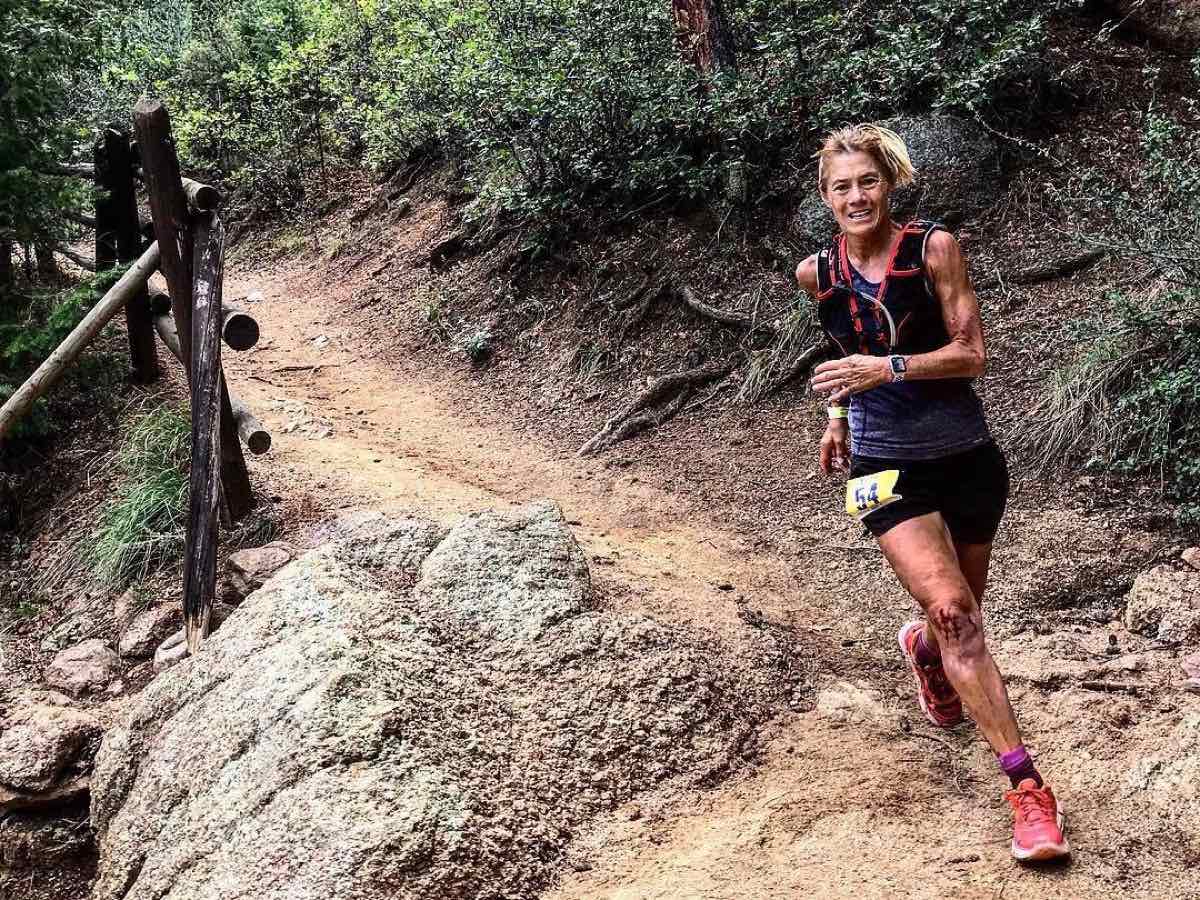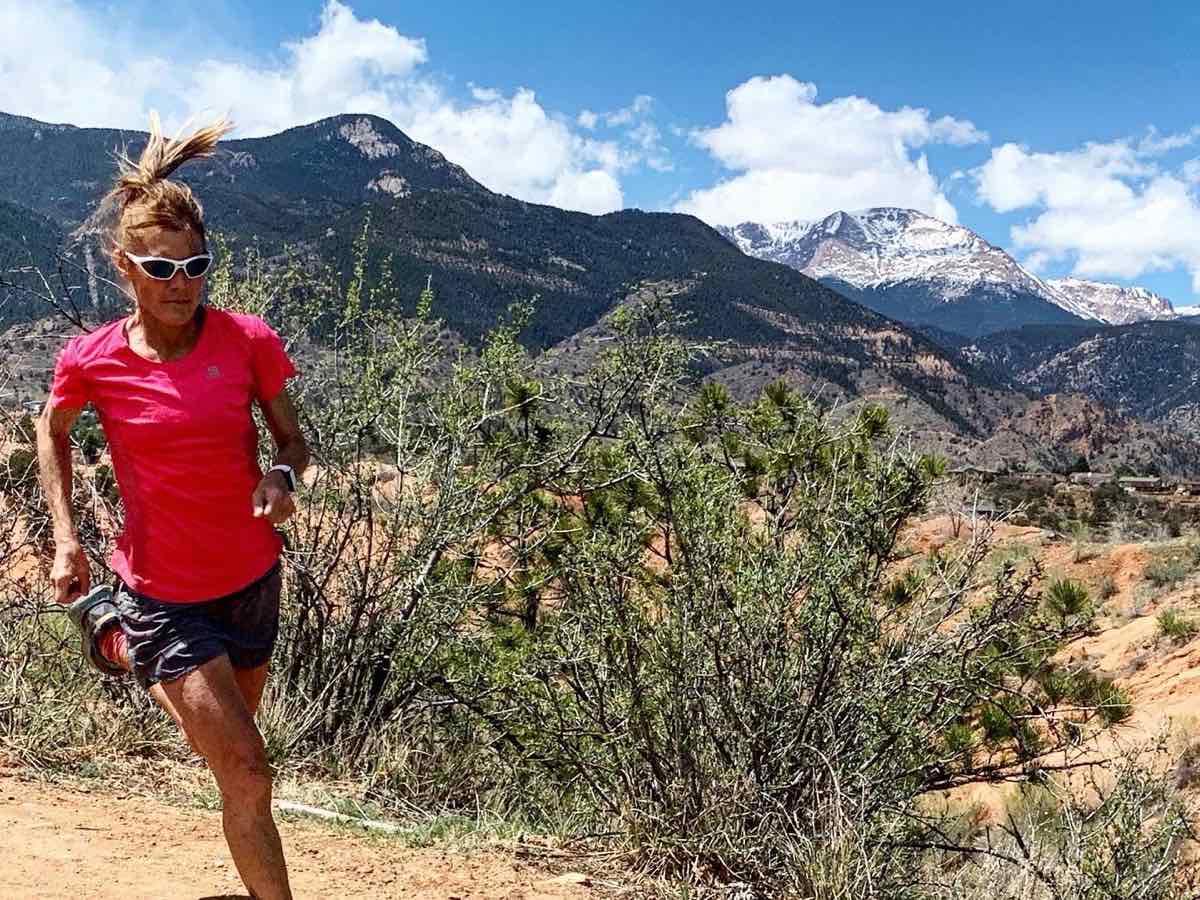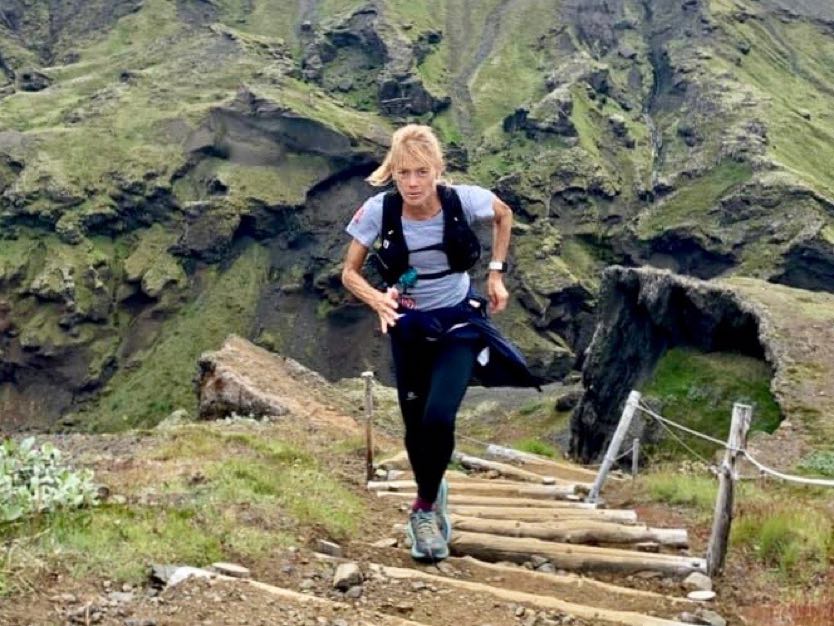‘Age-Old Runners’ is an article series where we explore runners’ performance potential after the age of 45 by interviewing excellent middle-aged runners. Is there still potential to improve? What roles do motivation, mindset, and specific training and recovery techniques play in allowing runners in their mid-40s to mid-60s to continue to excel? To learn more about this series’ goals, check out its introductory article.
Anita Oritz is 55 years old. She ran in high school and recreationally throughout college, but she didn’t start racing on the trails until she was 36, after her children were born. She’s won the Pikes Peak Ascent four times and the Pikes Peak Marathon twice. That last marathon win was in 2014 when she was 50. Anita was the U.S. Mountain Running Champion in 2003 and 2004. She has raced on the U.S. Mountain Running Team five times and was named Masters World Mountain Running Champion in 2004. Anita won the Western States 100 in 2009, when she was 45 years old, in 18:24:17.
The following is a transcript of a phone interview with Anita. It has been edited for brevity and clarity.

Anita Ortiz on her way to finishing eighth at the 2018 Pikes Peak Marathon at 54 years old. All photos: Nancy Hobbs
When did you start calling yourself a runner?
Well, I really called myself a runner way back when I was nine or 10. Because I lived in a neighborhood where it was all boys, and I was the only girl, and no one would play with me. And I was also a little sister. So I just ran around the house and I considered myself a runner.
Then for field day in sixth grade, I trained for the 600-meter dash or whatever it was. I actually did a training routine–just because I had nothing else to do. That was back in the day when every moment of your life after school wasn’t organized. Then I really started racing in middle school, and I was pretty good. I had school records. In high school, our team went to state in cross country. But I hated pressure, so I didn’t take a college scholarship that I was offered.
I kept running every day, but I didn’t compete again until after my last kids were born… until I was 36 maybe.
Did you always incorporate trail running into your training?
No. People didn’t really run on trails back then. You ran on the road; it’s what you did. Nobody ran on the trails. I lived in Vail, Colorado, and I used to want to run on these hiking trails but they were hiking trails. So I would go out really early, so no one would see me. I didn’t want to get in trouble running the hiking trails up Vail Mountain. I mean, even Matt Carpenter would do a lot of his running on the road, or the road up the mountain, not on the trails. It’s crazy. Then trail running came into vogue when I was having my kids. That’s when I started running on trails more. And I pretty much only ran trails after that.
What kind of racing did you do after your children were born?
I started out as a mountain runner, not as an ultrarunner. I remember my husband saying, “There’s this race in Manitou Springs, and you go to the top of this mountain called Pikes Peak, and it’s all on trail, and I think you’d really like it.” I went and I ran that, and I won it. And it was like, boom! That was it; I was sold. [Author’s Note: Anita won the Pikes Peak Ascent in 2001, 2002, 2003, and 2004. She won the marathon in 2009 and 2014.]
You ran your first ultramarathon, the White River 50 Mile, when you were 43. Why did you wait to start ultras?
You know, I ran White River and I was like, Why would you ever want to run that far? That’s so painful! That’s dumb! I’m never doing that ever again!
And besides I was still beating up on mountains. I was a multiple-time national champion, and had gone to worlds [the World Mountain Running Championships] lots of times. It’s really not good to train for both kinds of racing.
Have you always enjoyed racing?
I love racing; I hate the feeling that you get beforehand. When I’m actually out there, I love it. It’s like bloodsport.
I still love it. In fact, that’s why it’s hard for me now. I still want to do what I could do 10 years ago. And I still do pretty darn good, but I’m not like I was 10 years ago.
Are age-group records as exciting?
No. I just want to win. I mean, who wouldn’t? It’s fun to win.
Does not winning or getting on the podium make you less inclined to train or race?
No, I definitely know I can’t win everything. Do I want to win everything? Yeah. But can I? No. And I battle with that for sure. My coach, David Roche, is really trying to help me get it into my mind that you’re wonderful wherever you are–in that time, and in that moment, and in that place. Because I’m my own worst critic when I’m running and racing. But I’m getting a lot better.
What goes through your mind when a runner who is much younger passes you in a race?
Well, sometimes I’ll say to myself, Yeah, I’m giving you 20 years! But I still hold my own pretty well. I can still often get in the top three or top five.
Why do you think older runners stop racing?
I was talking to a friend of mine about this just the other day. I really think they leave because it’s hard to settle in your soul that you aren’t who you were. Nobody else expects you to run well, but you do. I often think, Where did they all go? It’s not that they’re not out running. It’s that it’s an internal struggle. I still try to get out there because, bottom line, I love running and racing more than I love winning.
Is it hard to wrap your mind around your body becoming a weak link in your racing?
Yeah. You’re training; you’re doing the work. And when you’re out there, if you get into your zone, you don’t even realize you’re going slower than you would have 10 years ago…. You feel like you’re going every bit as fast. I think that’s what’s really hard for people, to mesh those two things together and to say, “I’m alright with that.”
You can say, “I’m alright with being slower, and I’m still motivated to work as hard as my body can?”
Right. I’ve had to keep saying I like racing and running and that’s more important to me than the winning. But it’s taken me a while, you know.
What is your mileage like these days compared to what you were doing?
Well, for the past 11 weeks, I’ve had a broken kneecap, so my mileage has been nothing. But prior to that, I would run 20 miles three days a week. So between 80 and 90 miles a week…. I used to do a little bit higher than that, but I never used to take a day off like I do now. And I feel like I’ve become better because I take a day off. I struggled with tons of injuries until I started taking a day off from running.
Do you think back-to-back long runs are helpful?
Yeah, I’m a believer in long back-to-backs. If anything, it’s good mental training. And if you love running, it doesn’t seem like a job or chore. I just love being out.
Does recovery take longer now? Do you feel those back-to-back runs more?
Yeah, I’m sure I must. I don’t really allow myself much time to feel that way though. I work full-time, and though I don’t have them at home anymore, I’ve got four kids. So I don’t have time to feel not recovered.
Do you do specific speedwork?
I do. I used to do it a lot more than I do now. When I was running mountains, I was very regimented. With ultras, it’s still important, but it’s not quite the same. I like to do a lot of uphill repeats. Also, rolling speed ladders—done on trail only. Also some longer intervals and/or long tempo. I think, as I get older, I mix it up more and am a little less regimented. I’m not doing 400’s on the track anymore.
Where does strength work, stretching, and rolling fit into your training?
I do a little bit of strength stuff, but not much. My favorite go-to thing is my stair machine. It’s really no impact. I have a full gym in my basement. I use the stair machine, elliptical, bike, and treadmill a lot. I have weights, but my husband uses them mostly.
I roll some. I’m not a big believer in stretching. I just don’t. I start running a little slower and it all stretches out eventually.
I do core work every day, plank, general core, push-ups. I’m not super regimented.
Tell me about your daily diet.
I eat pretty much everything, and I definitely have some things I eat a lot of. I eat a lot of Pop-Tarts. They’re my favorite thing. I go through Pop-Tarts like crazy. I go through avocados like crazy too. And I love steak. There’s nothing I don’t eat.
What do you attribute your longevity in this sport to?
I think it’s a couple of things. First of all, I took that long time off where I just trained, and I didn’t compete, so I was doing nothing but building a base and having fun. Basically, it was like starting fresh again after the kids were born. And having my kids really gave me a lot of motivation. Three of my kids are girls, and I wanted to be a good role model. Also, I needed some time to myself. I love my kids to death; my life is devoted to them, but I needed some mommy time.
I think I’m a really well-balanced person, but I’m type A, so anything I’m going to do, I’m going to do it 1,010%.
What training mistakes do you see younger runners making?
I sometimes think that starting off with ultras right away…. That’s a lot of impact on your body. I think you’re missing a lot of fun that you can have in shorter races. You know, I just hope they don’t destroy their bodies too young.
When you heal up, and there are races on the calendar again, what do you want to race?
I’ve taken a long time off from 100 milers, and I want to try another one because I’m not happy with where I left off on those. Will I ever run as fast as I did at Western States? No. But have I reached my 100-mile potential? Can I do one, enjoy it, keep a good pace, and come out of it solid? I’m not there yet. I have a lot of learning to do. I have more to say to that distance.
Is there anything in particular about the body aging that you find distressing?
Yeah, I don’t like saggy legs. They blindsided me. [Author’s Note: If there’s one common thread in these interviews so far, this is it! Anita and I spent some time with this one.]
How long do you intend to keep training and racing?
Until the day I die.
Training specifics
- Weekly running volume: Eighty to 90 miles a week
- Strength training: Core work daily
- Off-season: Lower volume late fall through winter due to the weather
- Sleep: Four on a good night
- Race nutrition: Gels and Skratch
- Recovery: Runs short and easy the day after a hard race, then takes two to three days off
Three factors Anita attributes her running performance to:
- Passion for running in nature
- Determination
- Family support
Call for Comments (from Meghan)
Have you raced and run with Anita? Or have you followed her running career? Leave a comment to share a story!


